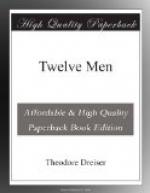Ah, Broadway! Broadway! And you, my good brother! Here is the story that you wanted me to write, this little testimony to your memory, a pale, pale symbol of all I think and feel. Where are the thousand yarns I have laughed over, the music, the lights, the song?
Peace, peace. So shall it soon be with all of us. It was a dream. It is. I am. You are. And shall we grieve over or hark back to dreams?
The County Doctor
How well I remember him—the tall, grave, slightly bent figure, the head like Plato’s or that of Diogenes, the mild, kindly, brown-gray eyes peering, all too kindly, into the faces of dishonest men. In addition, he wore long, full, brown-gray whiskers, a long gray overcoat (soiled and patched toward the last) in winter, a soft black hat that hung darkeningly over his eyes. But what a doctor! And how simple and often non-drug-storey were so many of his remedies!
“My son, your father is very sick. Now, I’ll tell you what you can do for me. You go out here along the Cheevertown road about a mile or two and ask any farmer this side of the creek to let you have a good big handful of peach sprigs—about so many, see? Say that Doctor Gridley said he was to give them to you for him. Then, Mrs. ——, when he brings them, you take a few, not more than seven or eight, and break them up and steep them in hot water until you have an amber-colored tea. Give Mr. —— about three or four tea-spoonfuls of that every three or four hours, and I hope we’ll find he’ll do better. This kidney case is severe, I know, but he’ll come around all right.”
And he did. My father had been very ill with gall stones, so weak at last that we thought he was sure to die. The house was so somber at the time. Over it hung an atmosphere of depression and fear, with pity for the sufferer, and groans of distress on his part. And then there were the solemn visits of the doctor, made pleasant by his wise, kindly humor and his hopeful predictions and ending in this seemingly mild prescription, which resulted, in this case, in a cure. He was seemingly so remote at times, in reality so near, and wholly thoughtful.
On this occasion I went out along the long, cold, country road of a March evening. I was full of thoughts of his importance as a doctor. He seemed so necessary to us, as he did to everybody. I knew nothing about medicine, or how lives were saved, but I felt sure that he did and that he would save my father in spite of his always conservative, speculative, doubtful manner. What a wonderful man he must be to know all these things—that peach sprouts, for instance, were an antidote to the agony of gall stones!
As I walked along, the simplicity of country life and its needs and deprivations were impressed upon me, even though I was so young. So few here could afford to pay for expensive prescriptions—ourselves especially—and Dr. Gridley knew that and took it into consideration, so rarely did he order anything from a drug-store. Most often, what he prescribed he took out of a case, compounded, as it were, in our presence.




